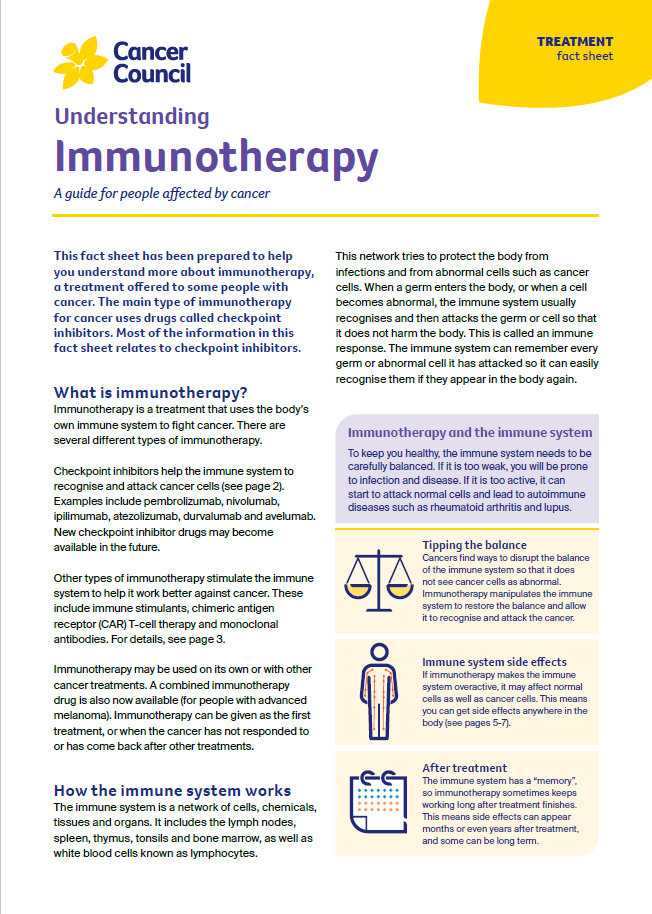- Home
- About Cancer
- Cancer treatment
- Immunotherapy
- Side effects of checkpoint inhibitors
- Managing side effects of checkpoint inhibitors
Managing side effects of checkpoint inhibitors
| Working with your treatment team | Because checkpoint inhibitors work differently from other cancer treatments, it’s important to work closely with your treatment team to monitor any side effects and how the cancer responds. |
| Discussing potential side effects | Before starting checkpoint inhibitors, discuss the potential side effects with your cancer specialist. Ask about the side effects that should be reported, who to report them to, and who to contact after hours. You can find out more about the side effects of specific checkpoint inhibitors at eviq.org.au. |
| Health checks before and during treatment | You will usually have some tests to check that you are well enough to have immunotherapy before treatment begins. Throughout treatment, you will have regular blood tests, and the team will ask you questions to check for early signs of side effects. |
| Ongoing monitoring of side effects | New side effects can appear months after having immunotherapy, so ask your cancer specialist how long you need to keep watching for side effects. |
Reporting side effects
| Report side effects early | Side effects can be better managed if reported early. It’s important to let your cancer treatment team know about new or worsening symptoms, even if they seem minor or you’re not sure if they are related to your treatment. If left untreated, side effects can become serious and may even be life-threatening. |
| Understanding symptoms | Sometimes it can be tricky to know whether your symptoms are related to the cancer or the treatment. Ask your cancer treatment team about this. |
| Sharing information with other health professionals | Because checkpoint inhibitor therapy is a newer cancer treatment, some health professionals, including general practitioners (GPs), may not yet be familiar with the side effects. Your team may give you a card with information about your treatment and potential side effects. You can show this card to other health professionals you see and ask them to consult with your cancer specialist. |
| Be cautious with new medicines | Do not start any new medicines, including probiotics, steroids, herbal therapies, or over-the-counter medicines, until you talk to your cancer specialist. If you become unwell, even years later, it is important to tell any health professionals you see that you have had immunotherapy. |
Treating side effects
Your doctor will talk to you about how to manage mild to moderate side effects. For example, you may be given a moisturising cream to treat a skin rash.
Moderate to severe side effects are often managed by pausing the checkpoint inhibitor and starting on steroid tablets, such as prednisolone.
In some cases, checkpoint inhibitors may be stopped until the side effects are better controlled. You may need to stay in hospital and/or have intravenous steroids or other medicines.
If side effects become severe, you may have to stop checkpoint inhibitor therapy permanently. Even so, you may continue to benefit from the therapy that you have already received because it may have “trained” your immune system to recognise cancer cells.
Although there is a risk of severe side effects, many people experience only mild side effects.
If you have had checkpoint inhibitor therapy, it’s important to speak with your cancer specialist before having vaccinations, including for flu or COVID-19.
→ READ MORE: Other types of immunotherapy
Podcast: Immunotherapy & Targeted Therapy
Listen to more episodes from our podcast for people affected by cancer
Video: What is immunotherapy?
Watch this short video to learn more about drug therapies, including targeted therapy and immunotherapy.
More resources
A/Prof Rohit Joshi, Medical Oncologist, Calvary Central Districts Hospital and Lyell McEwin Hospital, and Director, Cancer Research, SA; Rebecca Blackwood and Meiling Zhou, Nurse Consultants, Head and Neck Cancer Service, Peter MacCallum Cancer Centre, VIC; James Cormack, Consumer; Prof Simon Harrison, Director, Centre of Excellence in Cellular Immunotherapy and Haematologist, Peter MacCallum Cancer Centre, Royal Melbourne Hospital and Melbourne University, VIC; Dr Jia (Jenny) Liu, Medical Oncologist, The Kinghorn Cancer Centre, St Vincent’s Hospital and Senior Research Officer, Garvan Institute and ProCan Children’s Medical Research Institute, NSW; Angelica Miller, Melanoma Community Support Nurse, Melanoma Institute Australia, WA; Kate Moore, 13 11 20 Consultant, Cancer Council WA; Jason Sonneman, Consumer.
View the Cancer Council NSW editorial policy.
View all publications or call 13 11 20 for free printed copies.

